- Home
- Warren Hately
Frontline
Frontline Read online
Reporting The Apocalypse Book 1
Frontline
by Warren Hately
Contact the author at wereviking @ hotmail.com or follow @wereviking on Twitter
Visit warrenhately.com
for giveaways and regular updates
Cover by Ryan Schwarz
All characters appearing in this work are fictitious. Any resemblance to real persons, living or dead, is purely coincidental.
THE APOCALYPSE STARTED just in time for Anna’s first day on the job.
Of course, the early reports said nothing about the scale of the tragedy it would become. Instead, the Monday dawned bright and almost warm for a September in Illinois, with the troubles unfolding unnoticed across the city nothing more than just a few more sirens than normal in the air.
And with only four days in town since accepting the new position, and her bags still unpacked, Anna didn’t know what was normal, focused more on entering the lion’s den than anything else about to derail her world.
She steeled herself against nerves, smoothing out her skirt as she walked into the news conference, taking in the sense at once of the room now being too big for the downsized Gazette’s remaining half-dozen editorial staff. At the far end of the chamber, Lenore Barrett shot her a tight smile, then went straight back to business, stuck in a confab with a bullish, silver-haired man in his forties who she’d already warned about: the newspaper’s senior reporter Douglas O’Dowd.
Anna didn’t allow herself a pause, conscious of other eyes on her as Barrett hastened her exit from the unwanted discussion with O’Dowd, who then also cast hooded eyes Anna’s way, her unwelcomeness loud and clear for anyone to tell. Anna ignored him, moving to one of the many empty chairs around the long oval conference table which helped give the room its nickname: the Oval Office. Without a bagel or coffee machine in sight, she ignored her growling stomach as well, too anxious about her first day in the new role to eat anyway, and determined to be all business in front of the rest of the team who’d already had a fortnight to start dreading her arrival and the overhaul of their usual routine it foreshadowed.
“OK, let’s get down to it,” Barrett brusquely announced and managed another smile to soothe O’Dowd’s frustrated look.
“It’s the day we’ve been waiting for,” she explained and motioned to Anna, as if needing any further explanation. “Let’s make a start.”
Anna cringed at the editor’s words and tried not to redden, however that was meant to occur. Then she settled into a place beside a slim, streetwise young woman with a riot of frizzy black hair pinned up high. An equally young man wearing jeans, a rumpled t-shirt, and neck tattoos, had the seat on Anna’s other side, barely giving her a look, unlike the others – the Gazette’s resident IT guy Serik Iskov looked comfortable amid the better-dressed reporters despite his casual attire.
“I don’t know if anyone had the chance to meet Anna Novak when she dropped in on Friday, but obviously, here she is,” Lenore said.
The news editor took her position at the de facto head of the table where a stack of folders and an open laptop already sat at the ready. She awoke the laptop, and a pair of big display screens recently installed in the conference room came to life behind her showing the Springfield Gazette’s new-look web page, social media feeds, and then the camera view of the empty, rather contentious new live studio recently built in the Gazette’s third-floor office – and just down the hall.
Heads turned Anna’s way. She gave a self-effacing wave. Next to her, the young reporter Melina stood.
“Water?”
“Sure,” Anna said.
“It’s over there.”
Melina Martelle – also subject of a prior briefing – pointed to the jug and glasses on the room’s only side table and scooped up her satchel and notebook to relocate two empty seats away. Their mutual boss, Lenore Barrett, barely took in the move, eyes casting around the table as Anna stood as if on instinct. Committed to the charade, she then calmly walked around the table past Melina and poured herself a glass of water. It was impossible not to note similar sour looks from O’Dowd, but the others hardly noticed. A pudgy, bearded young man returned to fixing something vitally important on his smartphone, and a ridiculously good-looking young redhead entered the room late and looking sheepish, unwittingly taking Anna’s seat. Anna returned to the table and sat in the other recently-vacated chair and shot the latecomer a tight smile.
“Anna Novak,” she said and offered her hand.
“Hi, I’m Charlotte,” the younger woman said enthusiastically. “Charlotte Francis.”
“Charlotte’s the most recent addition to our team,” Lenore said.
“Last in, but not the last out,” O’Dowd sniped.
Anna’s expensive blonde eyebrows knitted together at his remark, but the editor only gave a terse laugh and adjusted the hang of her business jacket.
“Of course,” Lenore went on, “now it’s you who has that dubious honor, Anna.”
Anna nodded, taking in the tension, O’Dowd slumped back in his chair despite having a pen at the ready, notebook open, repeated underhanded looks Anna’s way that she couldn’t tell were belligerent or simply checking her out on the sly. Next to O’Dowd, Miss Martelle nursed her own brand of sour look. The technician Iskov seemed disinterested, press-ganged into conference just for his technical expertise.
Charlotte Francis was about the only one keen on Anna’s arrival, but her youth and disarming good looks somehow undermined any value in that, rendering her naïve instead. And the last member of the editorial team was the bearded twenty-something science reporter Demien Christopher, who peeled open a refresher towelette and seemed more concerned about his touchscreen display than anything else. Lenore had already confirmed rumors their lord and savior, billionaire tech guru Alban Sarabian, had insisted on the gormless reporter for the sake of a dedicated science page in every weekday edition – part of his deal for buying out the Gazette’s debts. Demien scrubbed his phone with tiny, furious circles, something ferrety as well as somehow haggard in his fixed stare that settled on Anna while he worked on his OCD.
Awkward, Anna turned rigidly back to their editor and offered a tight smile of her own.
“I get the sense everyone’s still adjusting to the changes,” she said in a diplomatic voice.
“They hired you to replace three people,” O’Dowd growled. “Three good people.”
“Douglas –” Barrett began.
“I take it you don’t see that as a vote of confidence in me, then?” Anna said to him.
She and the alpha male reporter locked eyes and Anna took a deep breath to steel herself against his imposing gaze made worse for its professional veneer. No matter how much like a spoilt child he looked right now, there was no mistaking Douglas O’Dowd hadn’t faced down many more intimidating foes than her in his career.
“I told you guys to get with the program,” Lenore snapped at last, unable to avoid the waspish tone in her voice.
“The staff cuts weren’t an indictment on Taelor, Robert, or Tsun,” she said.
“But keeping the rest of you definitely was. You’re here because you’re valued.”
Lenore let the words sink in. At some point she’d stood, hands braced on the table’s edge to command their attention.
“We had to make this change if any of us wanted to be reporters, still, this time next year,” she said and looked at each of them. “Clear?”
Barrett’s whiff of drill sergeant hadn’t come across during their cocktails late the week before, the night Anna flew into Springfield with her backpack and stack of equipment cases. She and the news editor had to be allies, no matter what – Anna’s survival in this new and difficult role depended on it. But however grateful she might be for L
enore’s support, Anna also knew she couldn’t play that card without ticking off everyone else.
Cute.
“Listen,” Anna said carefully to the room. A slight smile played across her lips and she banished it with a more serious look.
“I’m a reporter like the rest of you,” she said. “I get it.”
“I’m not sure being a reporter on Facebook counts,” O’Dowd said.
“There’s a bit more to my background than that.”
Lenore sat, giving Anna the floor, and the newcomer deliberately stood and circled the table, not quite reaching Barrett’s side, but commandeering the view of the two flat screen displays. Then she motioned to the monitors.
“I cut my teeth on papers in Atlanta and Philly,” she said. “I was on Fleet Street when online first started to really bite. They were gonna cut me, too, so I put my hand up for a support role. On a shoestring budget, we redesigned the London Leader’s CMS. It wasn’t a reporting role – HR called it ‘editorial support’ – but my interest was always making sure newspapers could survive the digital age.”
Her tone gently softened.
“Within a year, I had a team of my own,” Anna told them. “The Leader was the only paper in Western Europe not to lose more than ten per cent market share. We threw up a paywall a decade ago.”
Anna scoured her eyes over the other reporters because they all understood the significance of what she’d just said – but that didn’t stop her saying it again.
“A decade ago,” she repeated. “Every other paper was sitting with their thumbs in their butts watching revenue go down a hole. How long did it take the New York Times and the Journal to put up a wall?”
“Sure wasn’t ten years ago, I’ll give you that.”
Anna’s eyes flicked to Melina. The black woman gave her a curt nod. It wasn’t much more than that.
“As I understand it,” Anna said, “the Gazette was also headed down that hole.
You’ve got too much competition on the newsstands here as it is, without four TV stations and … crap like Buzzfeed getting in the mix. Your rivals, the other papers here in Springfield, they’re barely holding on too – holding on too long, in fact. The truth is, some of them need to crash and burn to give us a chance to break even. But it hasn’t happened … so it’s death by attrition.”
“In slow motion,” Lenore said in an equally somber tone.
Anna nodded at that and steepled her fingers. The website refreshed behind her and a frozen video shot of police rushing into action replaced the image of a woman outside a burnt-out restaurant in the city’s north.
O’Dowd cleared his throat again.
“How long until we’re not putting out a newspaper at all, then, and we’re just . . . reporting on Facebook too?”
The question went to Barrett and Anna concealed a tight sigh, wondering why the surviving troops still seemed so in the dark about the full extent of the revival plan.
“Anna hasn’t come here to kill the paper, Doug,” Lenore said with a scowl.
“I hired her to help us save it.”
THEATRICS ASIDE, THE tone in the room lightened just enough that Anna felt OK returning to her chair. Her light-blue eyes flicked back to the monitors. O’Dowd’s byline was on the latest piece beneath a headline: “Emergency crews in hectic night”.
She met Douglas’ gaze – him watching her acknowledge his credentials through the proof on the screen – and she fought her own face to return a professional smile clearly unsatisfactory to the “Silverback,” as Barrett had called him partway through her third blackberry G&T (and by no means the last G&T of their catch-up, Anna noted).
Still, O’Dowd’s nickname was apt. Despite pushing nearly fifty, the senior reporter had the build of a prize fighter with only a little middle-aged flab. He was just a couple of years older than Lenore – another bone of contention between them, Anna’d been warned – but Barrett put in the hard yards to look like a much younger woman, however much the bleach and a little discreet Botox helped out.
“This is all great,” O’Dowd said. “But we still have a newspaper to put out tomorrow – at least for now, no matter how thin it is – so we should get down to it, yeah?”
There was something more than job dissatisfaction driving O’Dowd’s haste.
The notepad wagged in his hand as if to remind Barrett of their cut-short conversation of just a few minutes before.
But the older reporter’s mood wasn’t helped by the conference door cracking open to admit the tall, slightly balding figure of Gus Fitzwilliams. The managing director wore a tan jacket he buttoned up as he entered, as apologetic as Charlotte Francis had appeared, despite his ultimate authority over them all. “Fitz,” as he was known, made a bee-line for the chair beside Lenore Barrett and sank into it with a contented yet unconscious sigh.
“Don’t mind me,” he told them. “My meeting with Mr Sarabian took longer than expected. Sorry.”
Fitzwilliams looked around the table with a smile Anna recognized from numerous past managers who’d also suffered a near total disconnect with their troops.
Coming fresh from a plush breakfast with the Gazette’s eccentric new owner didn’t help much. Fair-featured and handsome despite advancing years and too many meals on the corporate credit card, Gus crinkled his eyes in perhaps the slightest acknowledgment no one had much sympathy for the high-end hoops and somersaults he had to endure.
“We were just getting down to the news list,” Lenore said to him.
Fitz sniffled, satisfied, and O’Dowd shot him a veiled look their manager missed completely. It almost made Anna smirk, but O’Dowd wasn’t interested in a little bipartisan amusement – at least not from her.
“Can we talk about the fucking night we’ve just had, please?”
“Doug,” Lenore said. “We talked about this.”
O’Dowd fixed his stare on Anna instead.
“You said you did how long on Fleet Street?”
“Five years.”
“So you can handle a little salty language, then?”
“I’m more interested in the story you’re talking about,” Anna said off-handedly and motioned at the still image on the screen.
“You took that?”
“Kinda had to, didn’t I?” O’Dowd replied. “They cut our photographer to make way for you.”
Anna suffered the rebuke, though it wasn’t true by a fair margin. Fitzwilliams did all the hiring and firing – on Lenore Barrett’s instructions, when it came to editorial – but the structure they’d mapped out when Anna first got asked to join a group Skype call with Lenore and – the admittedly unusual – Alban Sarabian was also one hundred per cent Anna’s design, and so the blame felt fair enough to her. The new reality was all reporters were photographers now, with more power in their pockets than entire TV studios from the 1980s.
That Gus Fitzwilliams signed the photographer’s termination contract perhaps explained why he now cleared his throat and threw a hand across the table to communicate his conciliatory tone, though he couldn’t meet O’Dowd’s eye as he spoke.
“You know it wasn’t anything against Robert,” Fitz said. “We just can’t afford to carry such a specialist role anymore.”
O’Dowd twisted his own gaze away, muttering under his breath rather than answering directly.
“Yet we have a money for an ‘integration expert’.”
Lenore Barrett growled loudly at the head of the table, formidable as the goddess Athena in her pants suit.
“Can we not do this now, please, Doug?”
“My fucking name is Douglas,” he replied, also sans eye contact.
Something else obviously occurred to him, because the reporter suddenly snapped and motioned to the monitor across from them.
“I had to take that photo on my phone, for fuck’s sake,” he said. “My police sources are saying we just had a night like no one’s seen in twenty years, and you know Robert. He’d be in the thick of that action taking award-
winning images.
Instead, we’ve got me, fumbling around like a halfwit on my phone like a drunk college girl trying to take a selfie.”
He flicked a dismissive hand at the screen and couldn’t bear to look at Fitzwilliams’ manic beaming grin.
“And no one cares, Doug,” Fitz said. “Have you seen today’s page views already? Come on, it’s nothing against Robert. But today, they look at the pic for all of three seconds and then they want the news. Hell, they don’t even want words, they want video. Did you get any of that?”
The word “truculent” was about the only apt term to describe the look Douglas O’Dowd now pulled, lips easing back from his gums with disdain and never more resembling a mountain gorilla than in that moment of quiet fury and loathing.
“There’s no need to take images from your phone,” Anna said quietly. “With Mr Sarabian’s investment, we’ve bought two of the best, latest HD recorders featuring wireless satellite upload connections. I’m hoping to run you guys through some training with them this afternoon.”
It was Melina Martelle’s turn to play devil’s advocate, showing solidarity with the disgruntled Douglas O’Dowd as if he’d put his neck out as far as he dared for the day.
“We can’t even get through a news meeting,” she said. “And we have to put out the paper still. When do we have time for training?”
“I thought you would be up for it, Melina,” Anna said.
“And why’s that?”
“Your file shows you’re already active, you have a social media presence, you were one of the early adapters to online reporting,” Anna said, trying not to make it a list – the same list from her personnel file. “You worked for Gamma Ray, right?”
“Yeah,” Melina said reluctantly.
“What’s Gamma Ray?” Fitzwilliams asked.
Beside him, Lenore Barrett snickered.
“One of those cute little tech start-ups,” the editor said, “back when everyone thought ‘citizen journalism’ was the way of the future – and they hadn’t figured out they’d still need a way to pay the bills.”

 Hard Light- Infamous
Hard Light- Infamous Frontline
Frontline After the Apocalypse Book 3 Resurgence: a zombie apocalypse political action thriller
After the Apocalypse Book 3 Resurgence: a zombie apocalypse political action thriller After The Apocalypse Season 1 Box Set
After The Apocalypse Season 1 Box Set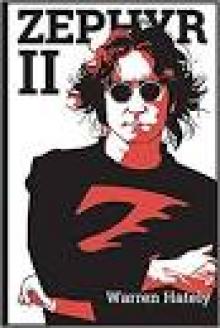 Zephyr Box Set 2
Zephyr Box Set 2 Zephyr Box Set 1
Zephyr Box Set 1 Endless Night
Endless Night After the Apocalypse Book 1 Resurrection: a zombie apocalypse political action thriller
After the Apocalypse Book 1 Resurrection: a zombie apocalypse political action thriller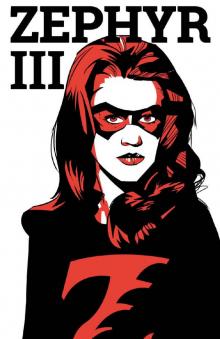 Zephyr III
Zephyr III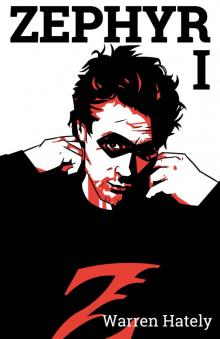 Zephyr I
Zephyr I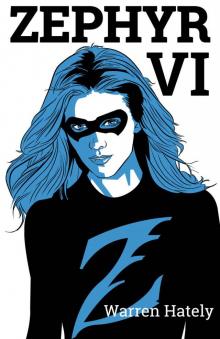 Zephyr VI
Zephyr VI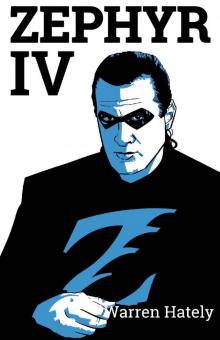 Zephyr IV
Zephyr IV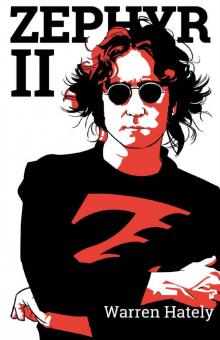 Zephyr II
Zephyr II